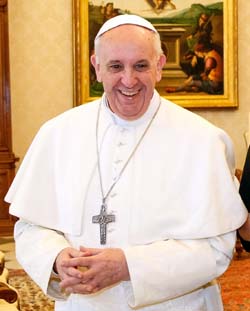In my view there is not yet a Eucharistic Famine in most parts of England, though there could be in some rural areas where parishes and their churches/chapels have been closed altogether. I think that the bishops of England & Wales know that there is soon going to be a problem, but they still exhibit the timidity/cowardice that has afflicted them since Humanae Vitae. I have been pressing advice on the bishops here since October, 1953. At 87 I am still at it, but I have to add that since 1964 I have been singularly unsuccessful. I have found that they will only act if they become severely embarrassed (just like our Prime Minister on the issue of refugees). I was very (but not totally) successful in getting the Catholic Education Service to publish the annual Catholic school censuses (which I established in 1955, but whose publication was suspended from 1992 to 2006), but despite five reports since 2004 on the unreliability of the Church’s pastoral and demographic statistics here I have had no success on that particular issue. On the issue of clergy numbers I have tried several times to get the 22 dioceses to cooperate with the PRC in the preparation of reliable statistics, so far without success. Most dioceses are so haphazard in their approach in this matter that an enquiry I made some five years ago into the age structure of their own clergy brought the astonishing admission from most of them that they did not know!
On much wider issues I am reading a short paper (on ‘structural sin’) at The Tablet’s 175th Anniversdary Conference in Durham, early in November. There will be several bishops there and I hope the paper will result in embarrassment for the Catholic Bishops’ Conference, but I am not putting any money on it. They have got so used to doing nothing until the Roman Curia tells them what to do (or stop doing) that I think there have lost any ability to do anything themselves to resolve the many issues facing the Church in this country.
In my own view the steps I would press on the Latin Rite Catholic Church are, in order of priority:
(i) Offer priestly ordination to all permanent deacons,
(ii) Open the permanent diaconate to all women over the age of (?), subject to the training currently required for male permanent deacons,
(iii) Offer reinstatement to all laicised priests (whether married or not) on terms that are acceptable (rather than humiliating),
(iv) Ask Episcopal Conferences either to make their own proprosals or to explain why they are not interested in ordaining married men as Latin Rite secular priests in their own territories.
I would add that, although there is a massive e-mail discussion (daily/hourly into my in-box) on these and other issues among the laity in this country, I have failed to persuade my friends in ACTA to take the initiative themselves, by establishing a National Pastoral Council and inviting all the bishops to attend. The laity here have in the last five decades got so conditioned to waiting for the bishops to do something that they seem to have lost either the will or the ability to take the initiative themselves.
The People Speak Out
Local voices connecting globally
This is important: to get to know people, listen, expand the circle of ideas. The world is crisscrossed by roads that come closer together and move apart, but the important thing is that they lead towards the Good. (Pope Francis) |
|
Canon Law 212 calls upon the laity to speak up:2 - The Christian faithful are free to make known to the pastors of the Church their needs, especially spiritual ones, and their desires.§3. - According to the knowledge, competence, and prestige which they possess, they have the right and even at times the duty to manifest to the sacred pastors their opinion on matters which pertain to the good of the Church and to make their opinion known to the rest of the Christian faithful, without prejudice to the integrity of faith and morals, with reverence toward their pastors, and attentive to common advantage and the dignity of persons. |
